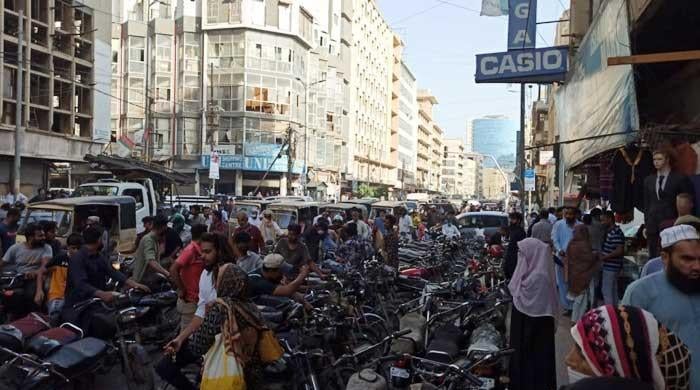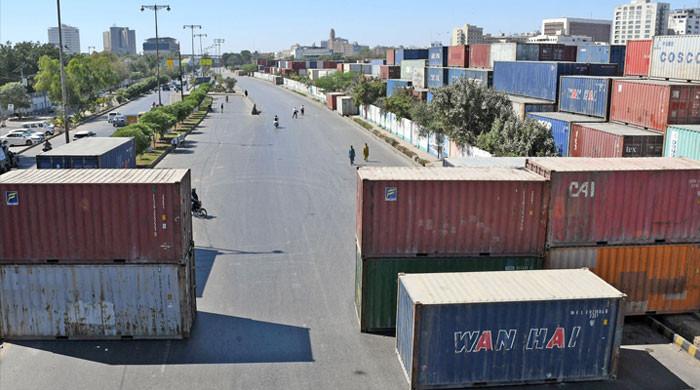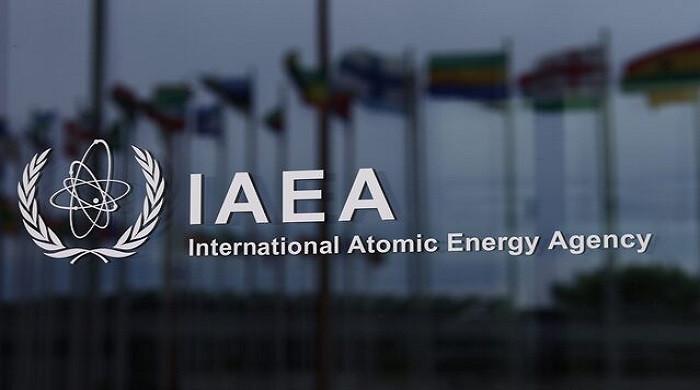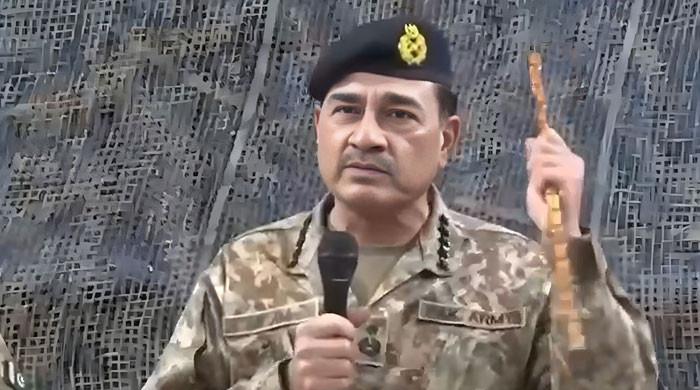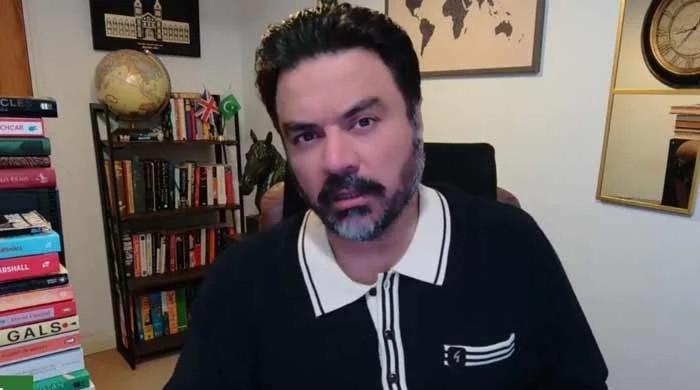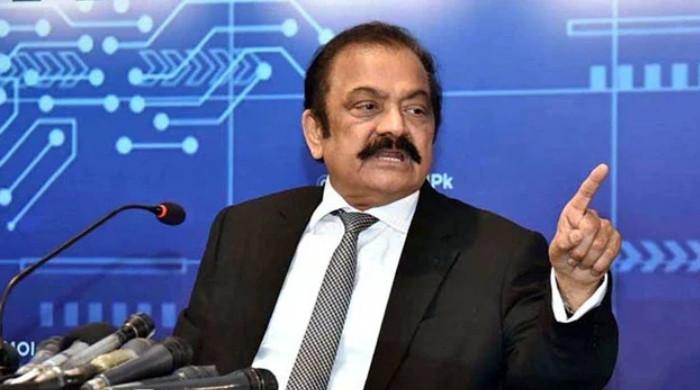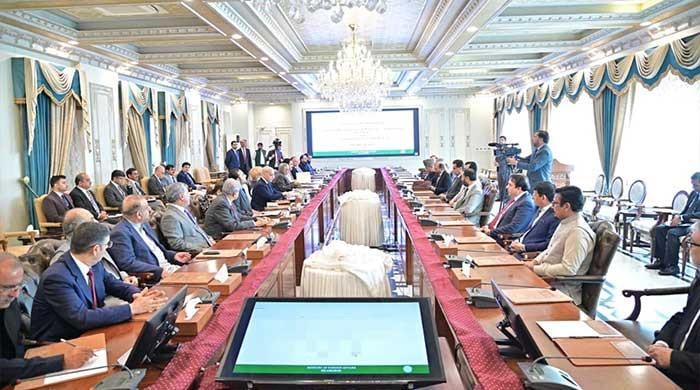Indian state institutions, including army, driven by extremist ideology: ISPR DG
It's important to make Indians realise via int'l mediation that strategic arrogance will not work, says Lt Gen Chaudhry
September 19, 2025
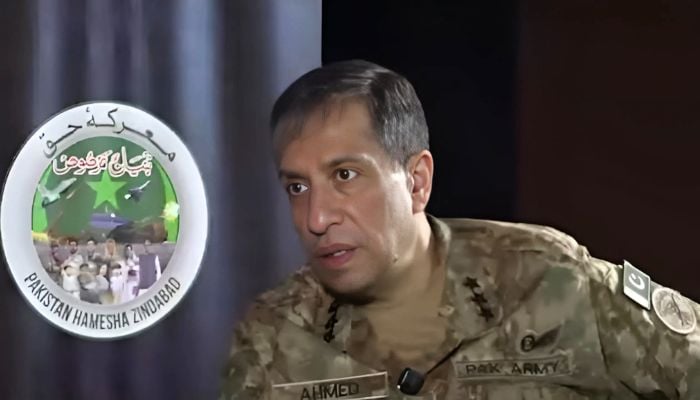
- There's no insurgency in Pakistan, only terrorism: Lt Gen Chaudhry.
- State, at no time, had policy of sponsoring terrorism, ISPR DG adds.
- Country has no "either or" approach on relations with other nations.
Director General of the Inter-Services Public Relations (ISPR) Lieutenant General Ahmed Sharif Chaudhry has assailed India and its state institutions, including the Indian Army, for being influenced by extremist political ideologies.
"It's very important that the international players, like US, they must intervene and resolve the issues which are the enduring reasons of the ongoing conflict [between Pakistan and India," Lt Gen Chaudhry said while speaking during an interview with a German news outlet on September 5.
Reflecting on the recent May conflict between the two nuclear-armed neighbours, the ISPR chief said that there has only been a ceasefire.
"The conflicts [between Pakistan and India] endure. Whether it's the Kashmir issue, whether its the state-sponsored terrorism of India. Whether it is the rising extremism of Hindutva mentality, or rationality that has gripped India.
"[....] It is important for the international community [...] through its mediation, the Indians are made to realise that this sort of irrationality, strategic arrogance, hubristic attitude that they've adopted, its not going to work."
Underscoring the Indian-sponsored terrorism inside Pakistan, Lt Gen Chaudhry said that what the country has endured for years is not "insurgency," but outright terrorism.
"The correct term is not insurgents, its terrorists. There is no insurgency in Pakistan. Whether its in Balochistan or KP. Its pure terrorism. We have no doubt in our minds that each terror incident that happens inside Pakistan, behind that is Indian support and abatement," Lt Gen Chaudhry said while speaking during an interview with a German news outlet on September 5.
With regards to the evidence of Indian-backed terrorism, Lt Gen Chaudhry recalled that at least six dossiers — from 2009 to 2023 — had been issued and provided by Pakistan to the international community reflecting Indian involvement in terrorism inside Pakistan.
Highlighting the country's ongoing efforts to root out the menace of terrorism, the ISPR chief said that the law enforcement agencies (LEAs) have carried out as many as 47,900 intelligence-based operations (IBOs) across the country in the ongoing year where at least 1,016 terrorists were gunned down and there had beena total of and 762 martyrdoms — including nearly 300 civilians.
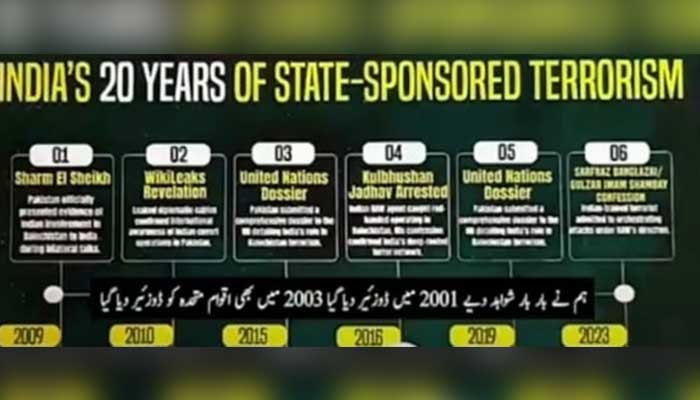
"If you see the quantum of efforts and this terrorism if it was only homegrown and home supported it would've been over way back. Just by the amount of threat against Pakistan, any sane mind can understand that this cannot go on without external, sustained support and a base of operations," he added.
When asked about the base of operations of terrorism, the military's spokesperson said that India's base of operation was Afghanistan.
"The Indians have a playbook of using terror as a tool of state. In Pakistan, their main tools are the Balochistan Liberation Army (BLA) and the Tehreek-e-Taliban Pakistan (TTP)," he said.
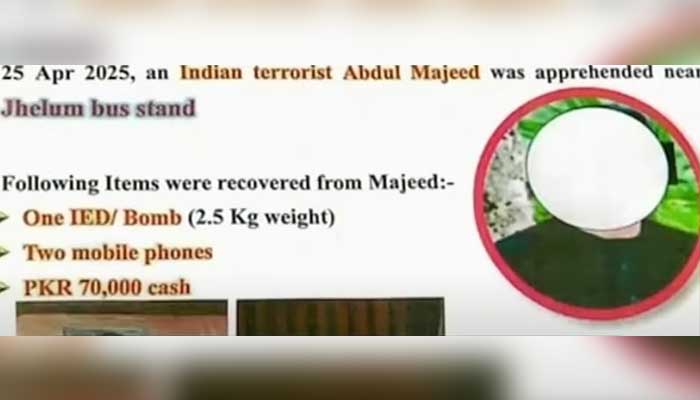
Responding to a question about why any Western partner of Pakistan has not endorsed Islamabad’s stance on India’s state-backed terrorism, the ISPR chief said that this was because New Delhi had a much bigger information and disinformation machinery at its disposal.
"The effort that the West needs to take, is that they have to accept that India is a terror-sponsoring state, and at the same time, you [West] have those economic relations and that notion of "net security provider'. There are some other lenses [through which] the West needs to look towards India." he noted.
Addressing the allegations claiming that Pakistan was supporting terrorism, the ISPR chief said, "This is part of the Indian disinformation campaign. This is a classic thing [where] you [India] yourself commit terrorism [and on the other hand] you start crying on top of your lungs — that the other side is committing terrorism".
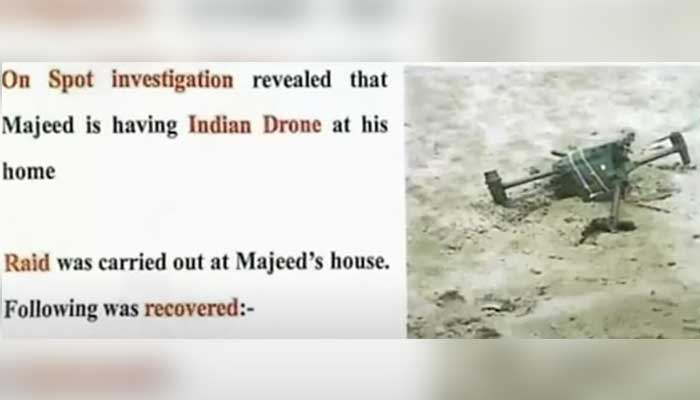
"Pakistan became a frontline state with the West, with the US especially […] These Mujahideen who were instrumental in taking on the Soviets [USSR] at that time. Once the Soviets left, these [armed groups] were left in Afghanistan.
“There was a long period of civil war [in Afghanistan], which Pakistanis suffered and dealt with. Because of that culture, our society suffered," he added, while stressing the cost paid by Pakistan both in human lives and economy.
When asked about Lashkar-e-Taiba (LeT) and Jaish-e Mohammad (JeM), Lt Gen Chaudhry stressed that the state of Pakistan at no time had a policy of sponsoring terrorism anywhere.
"We believe as a state that a terrorist has no religion. There is no Muslim, Hindu, Christian terrorist," he remarked, adding that Pakistan does not discriminate between terrorists and any non-state actors, and the action taken against them is in proportion to the posed threat.
"There is no space for any private army, militia in the country," he stressed.
'No either or'
When asked about Chief of Army Staff (COAS) Field Marshal Asim Munir’s recent visits to the US and their significance for Pakistan-US relations — in the wake of the India conflict — the ISPR DG said that Washington played a very constructive role back then.
"Pakistan and the US have a longstanding relationship. Over the period of time, we have been able to enhance and amplify our convergences and definitely manage the divergences. There are areas where a lot of engagement and discussions can be done,” he noted.
The military's spokesperson further maintained that Islamabad does not view its relationship with the US and other countries in “either or” terms and enjoys a constructive and strategic relationship with China and other countries.
Accentuating the scope of cooperation between Pakistan and the US in counterterrorism and intelligence sharing, he also thanked Washington for declaring the Majeed Brigade as a terrorist outfit.
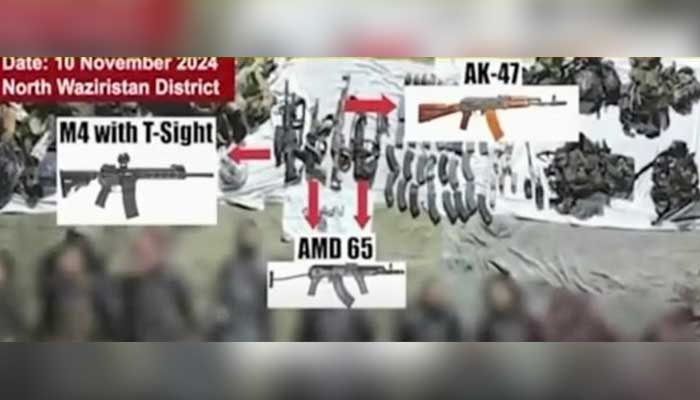
On the issue of weapons, left by the West in Afghanistan, being used by terrorist groups, Lt Gen Chaudhry pointed out the existing evidence of the weapons recovered from the terrorists involved in various attacks across the country.
"The amount of the weapons that they [Western forces] have left [in Afghanistan] is huge,” he noted, while further citing the SIGAR report, which says that over $7.2bn worth of US equipment was left in Afghanistan following the withdrawal of US and NATO forces.
"The non-state actors operating inside Afghanistan are not only a threat to Pakistan, but are a threat to the region and to the world at large," he stated.
Externalisation of internal problems
Censuring India's approach of externalising its internal problems and vice-versa, the military spokesperson highlighted that New Delhi faces an internal issue of the oppression of minorities, especially Muslims.
"If you see IIOJK, there are one million strong Indian security forces' personnel there. Any house can be searched at any time [….] and you blatantly say that Pakistan is sponsoring terrorism. So you [India] have an internal that you are externalising".
When asked about the grievances and the issue of “missing persons” in Balochistan, he said that such people are actually part of BLA and cited an inquiry commission’s report which found that out of the total 10,405 missing persons cases, 8,144 were resolved and 2,261 were under investigation.
A total of 2,911 missing persons cases were brought before the Commission of Inquiry on Enforced Disappearances, out of which 2,459 were resolved and only 452 were left meaning that there are more missing persons in Sindh and Punjab, he added.





